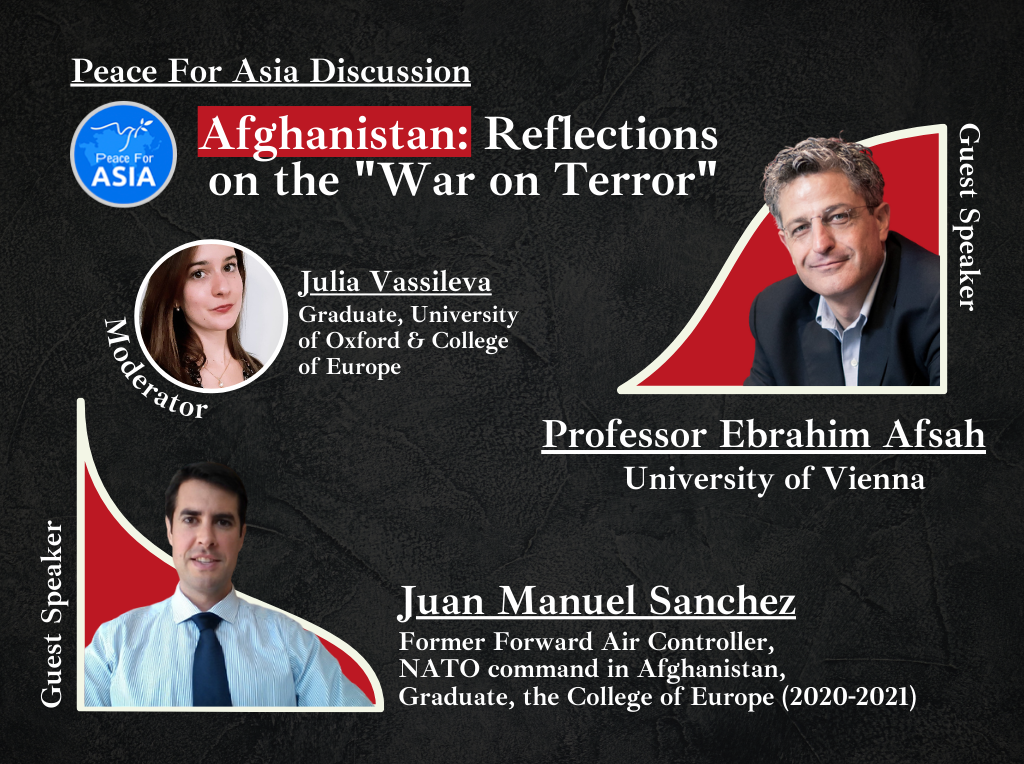To watch the Webinar click here.
On 15th September 2021, Peace for Asia held a webinar with Prof. Ebrahim Afsah, who shared insights on the current situation in Afghanistan, related to his experience working in Afghanistan. Prof. Afsah spent about 10 years in Afghanistan in various positions dealing with legal reform and administrative reform.
“The recent events are those which have called into question what we have done collectively but also as individuals”, Prof Afsah stated in the beginning of the webinar. “I spoke with many friends during the last few weeks (…) we wasted formative years of our lives in a futile endeavour. And perhaps more importantly it is an endeavour that was known to be futile for at least 10 years, probably longer. I am not aware of a single professional in the field who after 2008 still believed that this was a successful endeavour. And this is the real problem, the real challenge (…)”
“The Afghanistan intervention, like similar interventions in Libya and elsewhere, cannot be described in any other terms than a complete and utter disaster. It is a disaster not just in military terms, it is not just a disaster in operational terms, in civilian reconstruction, but perhaps most importantly, it is a disaster in intellectual and moral terms. Because we have clearly failed to create a socio-political vision that large numbers of people wanted to subscribe to.”
On the context of the region, Prof Afsah shared the view that there are various misconceptions about Afghanistan as a place in terms of mineral wealth, transit routes, and other potentially advantageous aspects about this territory, relating to the value that Afghanistan as a country could produce. Prof Afsah opined that the country “is simply geographically too remote, it is ethnically too diverse, and too hostile to permit any constructive economic or transit activity. That raises the question why outsiders keep going there.”
Prof Afsah shared that the human geography that is a very specific one, one that is “harsher than you see in other parts of the world.” The nature of the society is extremely fractured, and there is almost no “communal constructive engagement.” Prof Afsah stated that this is not only the case in Afghanistan; it is also in other conflict areas in the world (…) “And that is perhaps the second biggest challenge, (…) what do we do in geography like this? (…) And we do not have good answers to this.”
Crucially for our understanding of the context, Prof. Afsah also dispelled two very common myths:
First, the myth that the Soviet war destroyed the Afghan state: “this myth is wrong on at least two aspects (…) the Afghan state never really existed (…) The state was never much to start with, so not much was destroyed (…) We are not dealing with the reconstruction of a state, at best, the challenge would be different and that would be the creation of a state. And that is an infinitely more difficult and dangerous mission. The state was not destroyed, it never existed (…)”
The second myth: “The Taliban are not an alien imposition onto Afghanistan society, there is a large degree of convergence between what ordinary Afghans think is a proper way of life and what the Taliban are asking. And that convergence largely explains why they are so relatively successful, socially and militarily (…) It is not just the corruption that has led to the lack of support for the Kabul government. It is that the consensus that was agreed between the international community and some parts of the Afghan elite laid down in the Bonn agreement and laid down in the 2004-constitutions does not correspond with what ordinary Afghans consider to be a proper way of life.” In relation to this, Prof Afsah discussed the liberal constitutional order and the attempt to bring it to this region of the world: “The Afghans are particularly hard people to sell this package to, precisely due to the lack of historical experience with statehood, particularly liberal statehood (…) And even areas where this vision would be easier to sell, like for example in Iraq, we failed dismally. And that needs us to reconsider, either the project itself or certainly, how we ‘sell’ the project, how we convince people of the attractiveness of the liberal constitutional order.”
Further important topics discussed were the international acceptance of the Taliban, the conditions for the local population, the role of China, Iran, and Pakistan in the region.
In addition, Mr Juan Sanchez commented on operational aspects, the role of the EU, the importance of Turkey.

